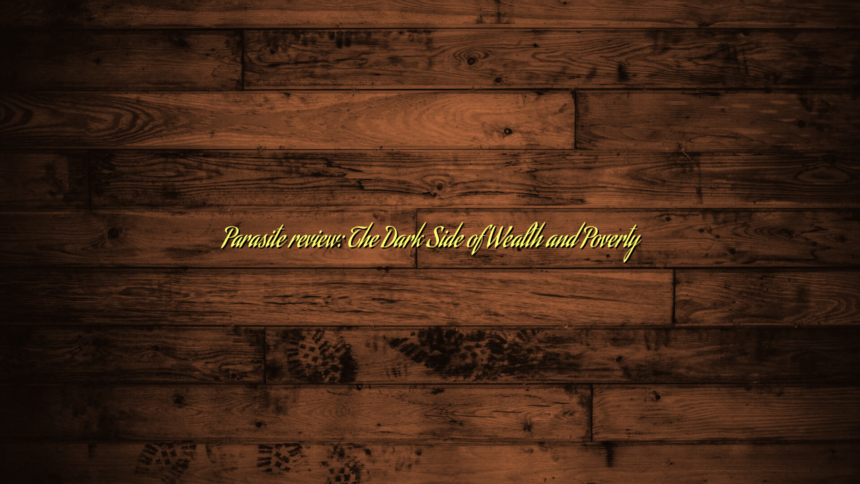Parasite review
The 2019 South Korean movie Parasite, directed by Bong Joon-ho, has captured the eye of world audiences and critics alike, turning into a cinematic phenomenon and successful quite a few awards, together with the celebrated Academy Award for Finest Image. However past its accolades, Parasite serves as a pointy commentary on the stark divide between wealth and poverty, leaving viewers each entertained and contemplative. This text offers a complete Parasite assessment, exploring its themes, characters, and the societal implications that resonate in at this time’s world.
The Premise: A Story of Two Households
On the coronary heart of the Parasite narrative lies a masterfully crafted story of two households—the rich Parks and the destitute Kims. The Kims wrestle to make ends meet, dwelling in a cramped basement, whereas the Parks take pleasure in lives of luxurious of their sprawling fashionable residence. The movie opens by showcasing the Kims’ determined makes an attempt to safe any type of employment, setting the stage for the bigger themes of social disparity and ethical ambiguity.
The Artwork of Deception
On this Parasite assessment, one of many key parts that stands out is the Kims’ ingenious methodology of infiltrating the Park family. The elder son, Ki-woo, secures a job as an English tutor for the Parks’ daughter by falsifying his {qualifications}, resulting in a sequence of misleading schemes that finally see your entire Kim household assuming varied roles inside the family, from drivers to housekeepers. This artwork of deception serves not simply as a plot gadget; it sharply critiques the lengths to which people will go to flee poverty.
Wealth and Energy Dynamics
The juxtaposition between the Kims and the Parks articulates a fancy relationship between wealth and energy. The Parks, blissfully unaware of the struggles confronted by the Kims, exist in a bubble of privilege. In the meantime, the Kims’ resourcefulness and crafty are portrayed as survival mechanisms in a society that usually marginalizes the underprivileged. This raises questions in regards to the ethics of wealth acquisition and the societal constructions that perpetuate cyclical poverty.
Cinematic Methods: Visible Storytelling
Bong Joon-ho employs a spread of cinematic methods to boost the narrative of Parasite. From sharp contrasts in lighting to the meticulous set design that symbolizes opulence and decay, each factor of this movie is a aware selection that displays the underlying tensions of the story.
Symbolism of the Home
The Parks’ home serves as a central character in itself inside this Parasite assessment. Its grand design symbolizes wealth and success, but it additionally acts as a fortress that separates the affluence of the Parks from the struggles of the Kims. The hidden basement, revealed in a stunning twist, represents the hid underbelly of society—the struggles and tales that exist beneath the floor of wealth.
Sound and Rating
The movie’s rating, composed by Jung Jae-il, additional amplifies its emotional resonance. The eerie soundscapes create a way of discomfort, foreshadowing the movie’s darker moments. This auditory craftsmanship is important in sustaining engagement and driving residence the lurking pressure between the 2 households.
Cultural Commentary: Reflections on Society
One of the crucial highly effective features of Parasite is its commentary on the socio-economic divides that plague up to date society. The movie resonates with audiences throughout the globe, reflecting common themes of inequality, desperation, and the lengths to which individuals will go to attain a semblance of stability.
Class Struggles
Within the Parasite assessment, the intersection of sophistication struggles is simple. The Kims signify the decrease class, characterised by their fast wit however restricted alternatives, whereas the Parks embody the higher class, largely insulated from the struggles of these much less lucky. The movie highlights how societal constructions typically dictate the paths people can take and the alternatives accessible to them.
The Cycle of Poverty
Because the narrative unfolds, Parasite deftly illustrates the cycle of poverty that traps people and households. The Kims’ makes an attempt to enhance their circumstances result in morally questionable choices, suggesting that in a system the place the wealthy get richer, the poor are sometimes pressured to compromise their ethics to outlive. This critique raises important questions on capitalism and the inherent flaws inside the system.
The Climactic Twist: A Stunning Revelation
The turning level in Parasite comes with a stunning revelation that reshapes the narrative. The invention of a secret hidden within the basement not solely alters the course of the Kims’ deception but in addition serves as an allegory for the hidden struggles that lie beneath the floor of society. This climax forces viewers to confront uncomfortable truths about inequality and the lengths to which people will go when pushed to their limits.
Ethical Ambiguity
What makes Parasite compelling is its refusal to color characters in absolute shades of fine and evil. The Kims exhibit each resourcefulness and morally doubtful actions, whereas the Parks, regardless of their wealth, reveal their very own ignorance and entitlement. This ethical ambiguity challenges viewers to think about their very own views on wealth and poverty, complicating the narrative moderately than offering simple solutions.
Conclusion: Classes from Parasite
On this Parasite assessment, it’s clear that Bong Joon-ho’s movie is just not merely leisure, however a profound societal critique that resonates deeply with up to date viewers. From its wealthy thematic exploration of sophistication wrestle to its astounding cinematic methods, Parasite serves as a mirror reflecting the tough realities of wealth inequality.
Actionable Insights
- Consciousness and Empathy: Parasite encourages viewers to domesticate consciousness and empathy for these going through financial hardships. Understanding the complexities of poverty can encourage actions that promote social change.
- Rethinking Wealth: The movie prompts a re-evaluation of our perceptions of wealth. Reasonably than viewing it as a mere image of success, it encourages a deeper understanding of the duties that include privilege.
- Partaking in Dialogue: Partaking in conversations about wealth disparity and sophistication struggles can foster group understanding and assist for initiatives geared toward addressing these points.
In abstract, Parasite is an unflinching exploration of the darkish aspect of wealth and poverty, and its classes are common. This multifaceted movie affords viewers a singular alternative to replicate on their very own society whereas being entertained, making it a timeless piece of cinematic artistry that challenges our perceptions of sophistication and morality. So, if you indulge on this compelling narrative, keep in mind: the shadows of wealth and poverty blur the strains of proper and mistaken, leaving us to ponder the actual price of our societal constructions.




